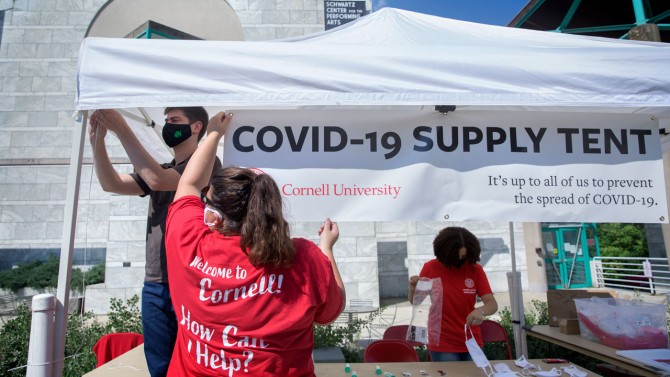
COVID-19 peer ambassador Bianca Santos-Declet ’23 distributed masks, hand sanitizer and touchless stylus tools from a tent in Collegetown during move-in week. Peer ambassadors and consultants will work throughout the fall to promote public health guidelines.
Peer pressure: Students promote culture of responsibility
By James Dean
From her COVID-19 supply tent in front of the Schwartz Center for the Performing Arts in Collegetown on a recent morning, Bianca Santos-Declet ’23 invited passersby to grab a free face mask, bottle of hand sanitizer or touchless stylus tool.
Many took her up on the offer: Students, parents helping their kids with move-in, members of a construction crew working across the street. In less than two hours, Santos-Declet estimated she had distributed at least 40 white cloth masks.
“I’ve been taking this situation very seriously,” said Santos-Declet, a pre-med student who has two vulnerable relatives at home in San Diego. “The people without a mask who put one on, you never know if that could save a life.”
Santos-Declet was one of dozens of students who volunteered to serve as COVID-19 peer ambassadors during move-in week, staffing five tents across campus.
Overall, more than 900 undergraduate, graduate and professional students have expressed interest in volunteering to serve as peer ambassadors or consultants this fall, proactively supporting the university’s public health campaign and reinforcing the behavioral compact in an effort to minimize transmission of the virus.
“These students will help normalize the use of masks and physical distancing, as well as other behavior changes that will be required of every Cornellian this fall,” said Laura Santacrose, assistant director of the Skorton Center for Health Initiatives at Cornell Health, which is training and advising the volunteers. “By sharing campaign messages, they can remind students that we’re all in this together.”
Students helped conceive of and implement the program, which includes two roles: COVID-19 peer ambassadors and COVID-19 peer consultants. Ambassadors like Santos-Declet will distribute personal protective equipment and model public health guidelines; they’ll also promote those guidelines among friends, on social media platforms and within organizations, clubs or teams.
“Students listen to students; students respect each other,” said Jenny Loeffelman, assistant vice president for student and campus life. “The modeling of good behavior by peers is going to be critical in making sure the student culture buys in to a safe and healthy community.”
Peer consultants will serve as a “think tank,” meeting weekly (virtually) with Skorton Center representatives to brainstorm opportunities to improve public health strategies, reimagine campus events and combat any “adherence fatigue.”
Consultants already have provided input and feedback on the COVID-19 online training module that all students were required to watch before attesting to the behavioral compact.
Students interested in participating in the programs should send an email to covidambassadors@cornell.edu or covidconsultants@cornell.edu.
Terence Burke ’21, president of the Interfraternity Council, helped develop the student-led programs as a member of one of the university’s reactivation subcommittees earlier this summer. He had noticed that when he wore a mask in Collegetown, others who had one under their chin or in a pocket would put it on before passing him.
“It kind of multiplies,” Burke said. “When you see people taking it seriously, it registers in your mind. Getting a core group of students dedicated to doing that seemed like a good way to go at it.”
The nearly 1,000 potential volunteers so far is almost double the number the programs initially hoped to attract – an indication, Burke said, of how much students want to be back on campus and to make a residential fall semester work.
Samantha Noland, who expects to graduate in December 2021 and is an adviser to the peer programs, said she heard “loud and clear” some local residents’ skepticism about returning Cornell students and wanted to be part of the solution. After thinking carefully about whether to return to Ithaca herself, she decided it was an opportunity to accomplish something significant.
“I don’t hear a lot about how hard some people are trying to make this work,” she said. “If we create a campus culture of everyone doing what’s best for public health, I think that really will pay off. A lot of it is student behavior, and that’s where the peer ambassadors and consultants come in.”
Noland plans to amplify public health messages on social media and contribute to outside-the-box thinking about how to create a meaningful campus experience in a mostly virtual context.
Ithaca native Isabel Dawson ’23 also plans to use social media to help normalize the new public health behaviors. After months of avoiding interaction with others, she said the peer-based program is helping to ease some of her anxiety about the virus.
“Now there’s something I can do that impacts more than just myself,” she said. “It feels really good. It feels almost cathartic.”
Back at Santos-Declet’s supply tent, Howard Miller ’89 of Long Island, who with his wife, Karen Saul Miller ’90, was helping their son Harris Miller ’24 move in to a campus residence hall, picked up a mask and sanitizer upon entering Collegetown.
“We think it’s a great thing,” Miller said of the peer ambassadors’ presence. “They’re helping keep the place safe, they’re helping keep it open, and they’re helping Cornell make history as the only Ivy League school to offer in-person instruction during this pandemic.”
His older son, Parker Miller ’21, agreed that the ambassadors could help influence fellow students to follow public health guidelines.
“It’s always better to have other students pushing for good,” he said, “rather than having a bunch of people tell you what to do.”
Media Contact
Get Cornell news delivered right to your inbox.
Subscribe

